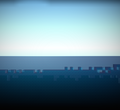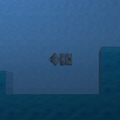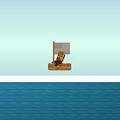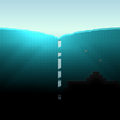Ocean: Difference between revisions
>Abcboy mNo edit summary |
>Abcboy m (→Gallery) |
||
| Line 18: | Line 18: | ||
==Gallery== | ==Gallery== | ||
<gallery> | <gallery> | ||
File: | File:Frozen Ocean.png|An ocean that froze over | ||
File:Frozen Fish.png|A fish caught in forming ice | File:Frozen Fish.png|A fish caught in forming ice | ||
File:Shark Pack.png|Three sharks together in the ocean | File:Shark Pack.png|Three sharks together in the ocean | ||
Revision as of 12:30, 20 July 2014
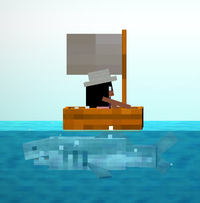
Oceans consist of large bodies of water blocks. They are typically deep with sloping shorelines, usually with sand near the surface. They sometimes surround small islands. Most coastlines have beaches.
While they can be crossed by swimming, they are traveled faster by boat.
The presence of an ocean on the surface may indicate a lowering of the beginning of magma below it.
Oceans in temperate climates may freeze over during the season of winter. This turns most of the surface blocks into ice. Oceans especially close to the poles may be permanently frozen, and not thaw even in summer.
Flora
Fauna
Gallery
-
An ocean that froze over
-
A fish caught in forming ice
-
Three sharks together in the ocean
-
Due to some quirk, a boat passing through snow piled on water (i.e. just-melted ice) may take to the air
-
An ocean draining into an unidentified submarine cave, triggered by a blockhead approaching
